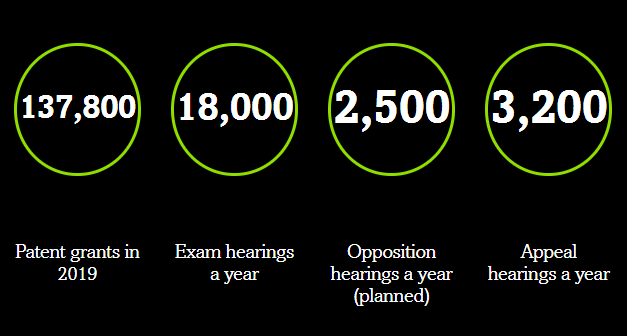
Video killed proceedings in Haar (well, nearly…)
The European Patent Office has been edging towards videoconferencing (VC) hearings for several years. The advent of coronavirus drove an almost instant shift towards compulsory VC for lower level cases, but overnight the EPO has announced that all hearings below Appeal will shift to VC for at least the majority of next year. We’ve seen this as inevitable for some time and, as early adopters and major EPO users, outline here just how vital it is to embrace this shift, and what a powerful tool VCs can be if used well.
What are hearings?
Hearings are a key aspect of EPO procedure, bringing fast resolution to examination proceedings (ex parte), facilitating post grant opposition (inter partes) and in both cases permitting certainty at second instance before the Boards of Appeal. Also termed “oral proceedings”, they are efficient - often lasting just half a day for ex parte cases - technically oriented and of high quality, and they are well used (see graphic). Traditionally they have been held in person principally in Munich, Germany and The Hague, Netherlands or, for appeals, Haar near Munich. But the EPO has been using VC for first instance exam since, amazingly, 1998 with over 2000 taking place last year. At Kilburn & Strode we were early adopters of the technology and can only agree with the EPO’s prognosis that they are “effective, popular and sustainable”.
What’s changed?
Coronavirus has massively accelerated the use of VCs; the EPO shifted rapidly and commendably to VC-only for exam within weeks of lockdown and launched a pilot scheme for opposition VC soon after. Limited uptake of the latter has occasioned the announcement overnight that all oppositions from January to mid-September 2021 will also be VC only. This is essential to keep the wheels of justice turning, and the EPO is backing up its shift with a continuing transition from Skype to Zoom. In other words ( barring some extreme exceptions) all first instance hearings will be conducted by VC.
What does the shift to videoconferencing mean?
We have been preparing on the basis that this was inevitable, and all our experience shows that the fact-oriented focus of the deliberations before the EPO lends itself perfectly to the medium. Handled well, VC can give better results, more quickly, and at lower cost. The flexibility VC introduces benefits both the proceedings and the participants; it is as well suited to cost-efficient examination proceedings as to complex multi-party oppositions, with or without simultaneous translation, and an ideal mechanism for targeting the discussion at the technical case points central to success before the EPO. Some elements are a straightforward improvement: we’ve had time to experiment and have found the EPO amenable to fixing afternoon starts for exam hearings to permit virtual attendance for applicants in the US, for example, massively enhancing accessibility. The adoption of Zoom is unintimidating and effective, and VC brings new tools such as screen sharing (which is already causing new rules to come out – it’s too effective!) And side channels are easily available allowing real time coherent attorney-client communications in place of that cascade of little yellow notes…
We have also found that the flexibility of venue for the attorney is highly attractive. Like many non-Munich firms our early investment in cutting edge office-based VC systems has allowed us to build our expertise over many years. Exceptionally, and fortuitously we shifted to fully flexible working last year; every colleague has a work laptop and identical functionality, office or home. Our systems are hosted in the cloud, with government level security and we made a quick lockdown-pivot from Skype to Zoom this year as our firmwide communications platform. That agility of work and of adaptation has enabled us to identify that the attorney can participate from wherever they need or want; what better preparation could you need, on a platform you know backwards?
What next?
There is one, lonely elephant in the room: Appeals. Despite a rearguard action from a small group of practitioners to retain in-person attendance it seems the Boards are listening too; there have been over 100 appeal VCs since May, and they are expected to consult very shortly about a full-scale shift from hearings at Haar to video. Appeals are big, complex and important sometimes, but this isn’t preventing VCs taking over in other weighty areas of law. Now the technology is up to scratch a shift to pure VC can undoubtedly work.
In the unlikely event the EPO reverts to in-person in the longterm, attorneys can dust off their pheromones and their well honed room-based skills and carry on. Reassuringly however, criteria suggested by the Boards of Appeal seem to support maintaining this new direction: they seek fair proceedings, a right to be heard and a right of access. VC provides all of this. And it’s worth noting that the EPO announcement permits their own opposition members also to attend remotely rather than from EPO premises. This set up works for everyone.
What we are seeing now is a wholescale move of the EPO to the cloud. It is worth pausing and thinking what that could mean, for flexibility, for sustainability, for access to justice, for efficiency – you name it. And once you remove the distraction of proximity, the attorney talent pool expands massively. A lot of attorneys are likely to struggle moving to the new way of working. We’re already there.
EPO notices:
https://www.epo.org/law-practice/legal-texts/official-journal/information-epo/archive/20201110.html
https://www.epo.org/law-practice/legal-texts/official-journal/president-notices/archive/20201110.html